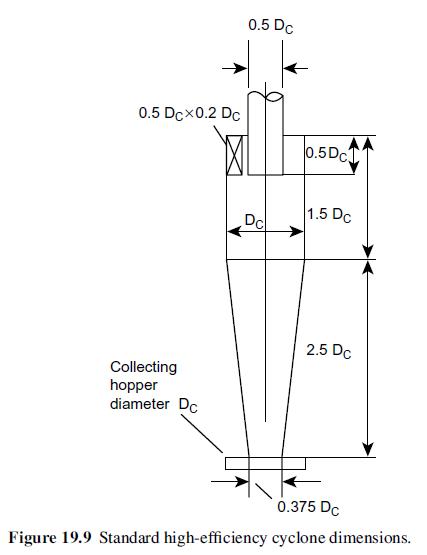Question: A cyclone of diameter D c of 2 ft, whose dimension ratios are as given in Figure 19.9, is being considered to remove dust from
A cyclone of diameter Dc of 2 ft, whose dimension ratios are as given in Figure 19.9, is being considered to remove dust from a cement kiln. The gas feed, at inlet velocity μi of 20 ft3/s, has 0.5 grain/ft3 of particles of average diameter dp of 7 mm and density ρp of 175 lb/ft3, where 1 lb = 7,000 grains. At the operating conditions, air viscosity is 1.21 x 10–5 lb/ft-s, and the air density is negligible compared to the particle density. The local air-pollution authority requires an effluent of less than 0.1 grain/ft3. Can this be achieved with the present cyclone? This can be determined by computing the fractional collection efficiency for the 7 mm particles from

 where Dpcrit = the diameter of the smallest particle that is theoretically separated from the gas stream at a collection efficiency of 50%. From [28],
where Dpcrit = the diameter of the smallest particle that is theoretically separated from the gas stream at a collection efficiency of 50%. From [28],

where Nt, the number of rotations made by the gas stream in the cyclone, is given by
![]()
with μi in ft/s.
0.5 Dcx0.2 Dc Collecting hopper diameter Dc 0.5 Dc Dcl 0.5 Dc 1.5 Dc 2.5 Dc 0.375 Dc Figure 19.9 Standard high-efficiency cyclone dimensions.
Step by Step Solution
3.44 Rating (160 Votes )
There are 3 Steps involved in it
To determine if the cyclone can achieve an effluent of less than 01 grainft3 you can compute the fra... View full answer

Get step-by-step solutions from verified subject matter experts


